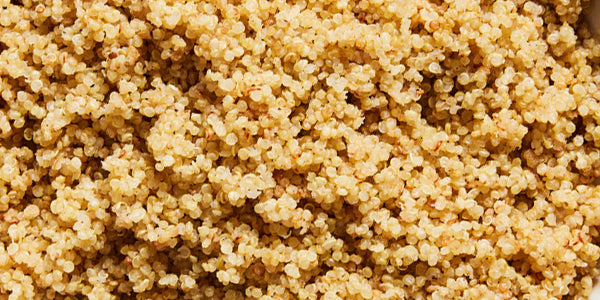Knowing what foods are good or bad for gout can sometimes feel like a guessing game. Many foods that are considered healthy in other aspects may be a bad choice if you are one of the millions of people who suffer from gout.
So, with diet changes being one of the best things you can do to prevent a painful flare-up, becoming familiar with gout-friendly (and not-so-friendly foods) can be essential. With this in mind, we’re taking a look at the gout credentials of one of the most popular grains: Is quinoa good for gout?
What is a gout-friendly diet?
Gout is an inflammatory condition caused by the formation of sharp uric acid crystals in the joints - particularly in the feet. It can cause severe pain and inflammation which can often be debilitating during flare-ups. These crystals form due to high uric acid levels in the blood - a condition known as hyperuricemia.
The cause of these heightened levels of uric acid can include liver dysfunction which prevents uric acid from being effectively filtered out of the body. However, other risk factors include genetics, obesity, and a high intake of purines.
Purines are a natural compound found in a vast number of foods, from fruits and vegetables to meat and dairy. Eliminating purines from your diet can be difficult. However, evidence suggests that opting for low-purine foods and avoiding high-purine foods can help reduce the chance of experiencing gout flare-ups. Hence, a low-purine diet is often referred to as a gout-friendly diet.
Some low-purines foods include:
- Seeds, such as chia seeds and sunflower seeds
- Nuts, including peanuts and walnuts
- Low-fructose fruits, such as pineapple and cherries
- Low-fat dairy products
- Vegetables
- Some meats, like chicken (other meats are fine in moderation)
Some vegetables, like spinach and asparagus, are technically considered to be high in purines; however, studies have shown that eating them as part of a balanced diet doesn’t increase your risk of gout attacks.
Some high-purine foods to avoid include:
- Excessive alcohol
- Red meat, lamb and pork
- Organ meats
- Some seafood, particularly shellfish (prawns, lobster, mussels), anchovies and sardines
- High-fructose products, such as juices and sweets
- High-fat dairy products
A low-purine diet is often recommended alongside other gout management methods. For example, drinking plenty of water can help your body flush out excess uric acid. Supplements are also available to help prevent a build-up of uric acid and prevent gout flare-ups.
Is quinoa good for gout?
While technically a type of seed, quinoa is often referred to as a grain due to its similar nutrient profile and versatility. But seed or grain, Quinoa is packed full of essential nutrients, fibre and protein. Originating in South America, this versatile product is now known as a “superfood” all over the world. It has gained massive popularity in recent years, thanks to its impressive nutritional value, its potential to be grown in various climates, and its suitability for those with gluten intolerances or celiac disease.
But what about if you have gout? Could quinoa be a good option?
Like other seeds, quinoa can be a great option if you have gout. Quinoa boasts various essential nutrients. In addition to containing high levels of fibre and protein, it is also considered a great source of folate, magnesium, zinc, and iron. But more importantly, it is also relatively low in purines.
Conclusion
Quinoa can be the bedrock of amazing salads, used as a stuffing for vegetables and meats, or even jazzed up as the star of the show in a healthy grain bowl. But whether you choose to incorporate quinoa as a healthy low-purine side dish or embrace its full potential as a main event, you can rest easy knowing that quinoa is a great addition to your gout-friendly diet.






